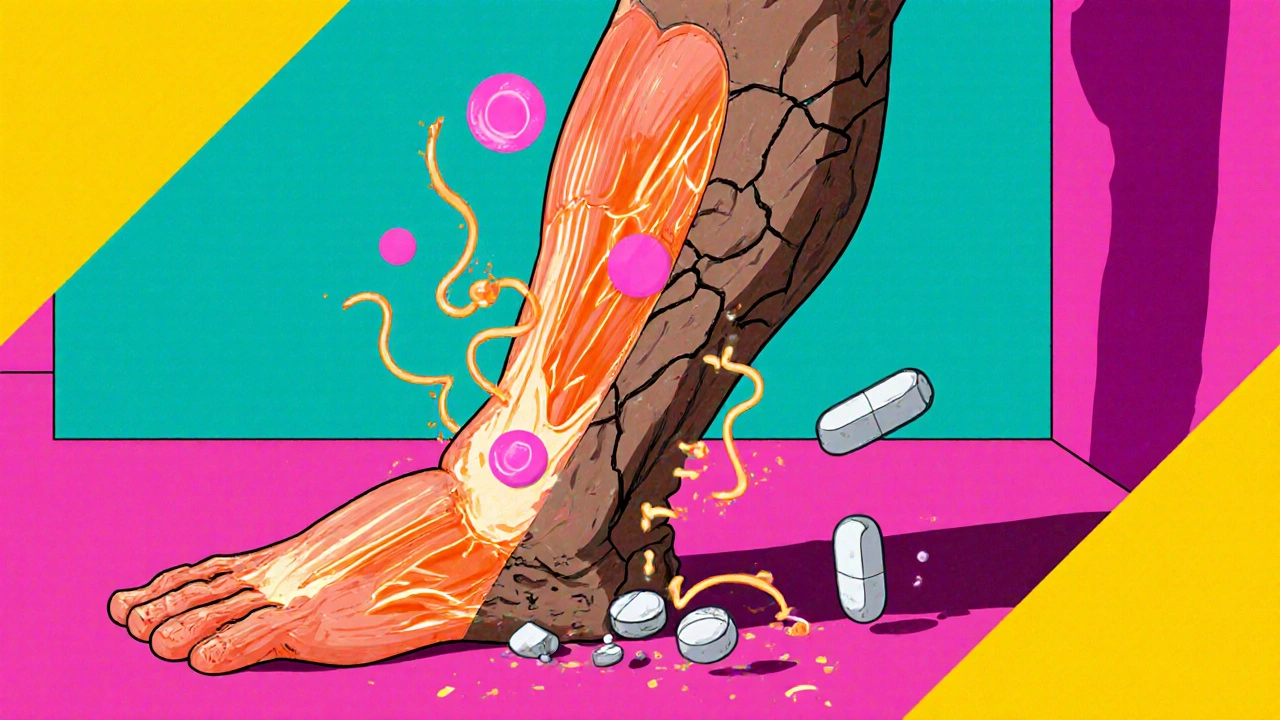CoQ10 Effectiveness Estimator
Find out how likely CoQ10 might help you
This tool estimates your probability of symptom improvement from CoQ10 based on research from the article and clinical studies.
Your Results
Millions of people take statins to lower cholesterol and protect their hearts. But for 5 to 20% of them, the cost is muscle pain-aching legs, tired arms, cramps that won’t quit. Some stop taking their statins because of it. And that’s dangerous. Stopping statins without a plan increases heart attack and stroke risk. So what if there was a simple, safe fix? Enter Coenzyme Q10, or CoQ10. It’s a natural compound your body makes, and it’s also sold as a supplement. The theory? Statins lower CoQ10 levels, and that might be why your muscles hurt. But does it actually work?
Why Statins Might Be Causing Your Muscle Pain
Statins work by blocking an enzyme called HMG-CoA reductase. That’s how they bring down LDL cholesterol. But here’s the catch: that same enzyme is also needed to make CoQ10. When statins slow it down, your body produces less CoQ10. Studies show this drop can be as high as 54% in your bloodstream. CoQ10 isn’t just some random vitamin. It’s essential for energy production in your muscle cells. Without enough of it, your muscles can’t make energy efficiently. That’s when fatigue, soreness, and cramps start showing up.It’s not the same for everyone. Some people feel nothing. Others get so sore they can’t walk up stairs. The pain usually shows up within the first few months of starting a statin. It’s often worse in older adults, people with kidney issues, or those on higher doses. And it’s not just one statin-it happens with atorvastatin, simvastatin, rosuvastatin, and others.
What Does the Science Say About CoQ10?
The evidence is messy. Some studies say yes, CoQ10 helps. Others say no. A 2018 meta-analysis in the Journal of the American Heart Association looked at 12 trials with nearly 600 people. Those taking CoQ10 (usually 100-200 mg daily) reported less muscle pain, less weakness, and less tiredness. The difference was clear: pain scores dropped by about 1.6 points on a 10-point scale. That’s meaningful. But here’s the twist: blood markers of muscle damage, like creatine kinase, didn’t change. That means CoQ10 might be helping how you feel-not fixing what doctors measure in the lab.Then there’s the 2013 review by the National Lipid Association. They looked at the same studies and said: “We can’t say for sure.” Why? Because the trials were small, short, and used different doses and forms of CoQ10. One study even found that people on statins had higher CoQ10 levels in their muscles-something no one expected. So maybe the problem isn’t just low CoQ10.
More recent studies, like the one from 2021, show steady improvement after 12 weeks of 100 mg daily. Another in 2012 found a 33% drop in pain after just 30 days. But not every trial worked. A 2007 study gave 200 mg daily for 12 weeks and saw no benefit. So what’s the difference? Maybe it’s the form. Ubiquinol-the active, reduced form of CoQ10-is better absorbed than ubiquinone. Many supplements still use the older form. Or maybe it’s the person. People who already have low CoQ10 levels might respond better. We don’t know yet.

What Do Real People Say?
Ask someone on Reddit or Amazon, and you’ll hear a different story. On r/Supplements, 78% of 142 people said CoQ10 eased their muscle pain. One user wrote: “After six months of leg cramps on atorvastatin, CoQ10 200mg daily eliminated my symptoms in three weeks.” On Amazon, CoQ10 supplements average 4.2 out of 5 stars, with over 60% of 5-star reviews mentioning statin-related pain relief.But not everyone wins. On Drugs.com, a user named MaryT tried three brands at 200 mg for four months and felt nothing. In patient forums, 67% reported some benefit, but only 32% called it “significant.” That’s the reality: it works for some, not all. If you’re one of the people who responds, it can be life-changing. If you’re not, you’ve spent money and time with no payoff.
How to Try CoQ10 If You’re on Statins
If you’re experiencing muscle pain and your doctor says it’s likely from your statin, trying CoQ10 is low-risk. Here’s how to do it right:- Start with 100-200 mg per day. That’s the range most studies used. Don’t go over 300 mg unless your doctor says so.
- Choose ubiquinol. It’s the form your body uses directly. It’s more expensive, but better absorbed-especially if you’re over 40 or have digestion issues.
- Take it with food. CoQ10 is fat-soluble. Take it with your breakfast or dinner, especially if it has eggs, avocado, or nuts.
- Give it time. Don’t expect results in a week. Most people feel changes after 4-6 weeks. Some need 12 weeks.
- Track your symptoms. Keep a simple journal: rate your pain on a scale of 1-10 each day. Note if you’re sleeping better, walking farther, or feeling less tired.
Stop if you don’t feel better after 3 months. That’s long enough to know if it’s working. And if your pain gets worse or you notice swelling, dark urine, or extreme weakness-call your doctor right away. That could be something more serious.

Cost, Safety, and What Your Doctor Thinks
CoQ10 is cheap. A month’s supply costs $15-$40, depending on the brand. Compare that to switching statins, which can cost $300-$600 a month under some insurance plans. And CoQ10 is safe. No serious side effects have been reported in 40 years of use-even at doses up to 600 mg. Some people get mild stomach upset or trouble sleeping, but that’s rare.Most cardiologists know this. A 2021 survey found that 42% of them recommend CoQ10 to patients with statin-related muscle pain-even though the evidence isn’t perfect. Why? Because the risk is low, the potential benefit is real for some, and stopping statins is risky. Mayo Clinic, Cleveland Clinic, and others include CoQ10 in their “therapeutic trial” protocols for statin intolerance. They don’t call it a cure. They call it a tool.
What’s Next? The Big Questions
We still don’t know who will benefit most. Is it older people? Those with low baseline CoQ10? People on high-dose statins? A 2022 European Atherosclerosis Society paper called for better ways to identify who’s likely to respond. Researchers are also looking at combining CoQ10 with other nutrients like vitamin D, magnesium, or omega-3s. Early results are promising, but nothing’s confirmed yet.One thing’s clear: statins save lives. If you’re on one, don’t quit because of muscle pain. Talk to your doctor. Try CoQ10. Track your results. If it helps, keep going. If it doesn’t, there are other options-lower doses, different statins, or non-statin meds like ezetimibe or PCSK9 inhibitors. But CoQ10 is the safest, cheapest first step.
For now, the answer isn’t yes or no. It’s: It might help. And for someone stuck between a heart attack and muscle pain, that’s enough to try.
Can CoQ10 lower cholesterol like statins do?
No, CoQ10 does not lower cholesterol. It has no effect on LDL, HDL, or triglycerides. Its only role in statin therapy is to potentially reduce muscle side effects. If you’re taking CoQ10 to replace your statin, you’re putting your heart at risk. Always keep taking your statin unless your doctor tells you to stop.
How long does it take for CoQ10 to work for muscle pain?
Most people notice improvement between 4 and 12 weeks. Some feel better in 3 weeks, especially if they’re taking the ubiquinol form. But don’t give up before 6 weeks. Muscle recovery takes time, and CoQ10 needs to build up in your tissues. If you don’t see any change after 3 months, it’s unlikely to help you.
Is ubiquinol better than ubiquinone for statin users?
Yes, ubiquinol is generally better. It’s the active form of CoQ10 that your body uses directly. As you age, your ability to convert ubiquinone to ubiquinol drops. Studies show ubiquinol raises blood levels 2-4 times higher than the same dose of ubiquinone. For statin users, that means more CoQ10 reaches your muscles. It’s more expensive, but worth it if you’re serious about trying it.
Can I take CoQ10 with other supplements or medications?
CoQ10 is safe with most supplements and medications. It doesn’t interfere with statins, blood pressure meds, or diabetes drugs. Some people take it with vitamin D, magnesium, or omega-3s for extra muscle support. But if you’re on blood thinners like warfarin, talk to your doctor first. There’s one case report suggesting CoQ10 might reduce warfarin’s effect, though it’s rare.
Should I get my CoQ10 levels tested before starting?
No, and it’s not practical. Blood tests for CoQ10 aren’t standardized, and levels don’t reliably reflect what’s happening in your muscles. Even if your blood level is low, it doesn’t mean your muscles are. The test costs hundreds of dollars and isn’t covered by insurance. Just try CoQ10 as a therapeutic trial-no test needed. If you feel better, you’ve got your answer.
What if CoQ10 doesn’t help my muscle pain?
Then talk to your doctor about other options. You might switch to a different statin-rosuvastatin or pravastatin are less likely to cause muscle issues. Or reduce your dose. Another option is ezetimibe, which lowers cholesterol without affecting CoQ10. For high-risk patients, PCSK9 inhibitors are very effective and don’t cause muscle pain. The goal isn’t to find the perfect supplement-it’s to keep you on heart-protecting therapy.






jalyssa chea
November 17, 2025 AT 01:08Gary Lam
November 17, 2025 AT 18:27Peter Stephen .O
November 18, 2025 AT 16:04Andrew Cairney
November 19, 2025 AT 22:25vinod mali
November 21, 2025 AT 15:21Jennie Zhu
November 22, 2025 AT 02:39Kathy Grant
November 22, 2025 AT 07:41Robert Merril
November 23, 2025 AT 20:28Noel Molina Mattinez
November 24, 2025 AT 14:45Roberta Colombin
November 25, 2025 AT 15:42Dave Feland
November 26, 2025 AT 10:17Ashley Unknown
November 26, 2025 AT 11:17